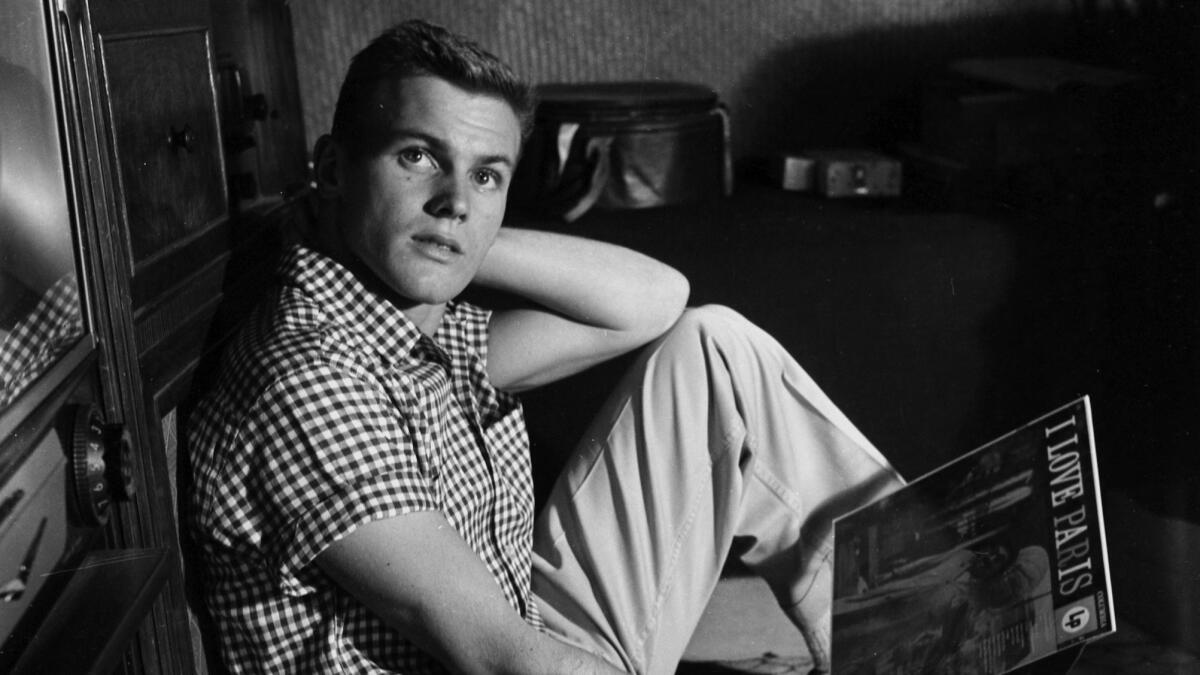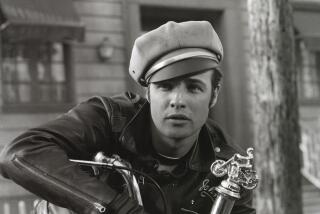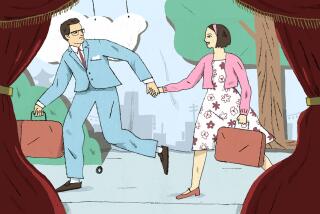Appreciation: Tab Hunter handled his Hollywood journey with grace, modesty and humor

In the 1950s, an America not reeling from world war or economic depression for the first time in decades reveled in its prosperity. There was time for leisure, and even new leisure markets, such as the hitherto little-noted category of “teenagers.” The latter suddenly merited their own music and movies, featuring custom-tailored pop stars and movie stars — often young male dreamboats with invented, pet-like names such as Rock, Sal, Guy or Tab… as in Tab Hunter.
Hunter died July 8 of heart failure at age 86, outliving his popular vogue by more than half a century. But he remained fondly remembered as an exemplar of prime beefcake in the waning years of the Golden Age movie studio system.
He also later distinguished himself as notably good-humored and articulate about surviving that eventually limiting teen-idol image, not least as a closeted gay man. Unlike many contemporaries, he happily abandoned the closet when no longer under great professional pressure to stay there.
Typed early on as a pretty boy, he proved he could really act when given the chance — which wasn’t as often as he would have liked. But as demonstrated by his well-received 2005 autobiography “Tab Hunter Confidential,” as well as the documentary feature made from it a decade later, that was one more thing he took with good grace. On-screen, and by all accounts off, Arthur Gelien, a.k.a. Tab Hunter, was modest, charming, adaptable and a hard worker.
And, of course, very, very handsome, in a classic all-American boy manner that might almost seem too retro today: Blond hair, blue eyes, 6-foot athletic build, a ready smile of pearly whites. A generation of girls dreamed of bringing “The Sigh Guy” — one among many promotional gimmicks he’d eventually labor to escape — home to meet Mom and Dad.
To them, he was the perfect prom date, the personification of “Young Love” (also the title of his treacly 1957 No. 1 single, one of the early rock ’n’ roll era’s biggest hits). He seemed to have tumbled out of the country club cabana on his way to the sock hop, perhaps helping a little old lady across the street en route.
Actor Tab Hunter dies at 86; ‘50s heartthrob’s career ranged from ‘Battle Cry’ to ‘Polyester’ »
But his background wasn’t all that suburban or squeaky clean, having been raised in Long Beach by a divorced German emigrée mother often absent from home by work who frequently uprooted him and brother Walt. The shyer of the two, Art was odd-jobbing at a Southern California ranch when he was befriended by actor Dick Clayton, who in turn fatefully introduced him to agent Henry Willson — the man who almost single-handedly created the screen-hunk heyday of the Eisenhower era.
Swiftly rechristened in more marquee-friendly terms, Tab joined a “stable” of strapping young talents that would include Rock Hudson, Guy Madison, Troy Donahue and John Saxon. Gay himself, Willson kept his clients’ closet door tightly shut. But he could also open it to the press to punish his clients, as he later attempted when Hunter opted to freelance under different representation.
The newcomer’s first important role was as a Marine shipwrecked with Linda Darnell in 1952’s “Island of Desire,” both them trying to resist temptation — a cougarish variation on “The Blue Lagoon.” For his audition, and most of 102 Technicolored minutes, 20-year-old Hunter was asked to be shirtless. Not much acting was required of him, let alone appreciated by the critics, but the targeted demographic duly swooned.
He soon signed to Warner Bros., performing largely in less-than-prestigious westerns, often paired with another young contract player, Natalie Wood.
When he successfully fought for better vehicles, as in the filmed Broadway musical “Damn Yankees” (1958) or Raoul Walsh’s 1955 war drama “Battle Cry” (for which he reportedly beat out James Dean and Paul Newman), he was very good. He also worked to extend his range with diverse roles on TV and occasionally onstage.
But the dreamboat image that had made him a star proved an albatross once he began aging out of teen fandom. In 1960-61, he had a moderately successful sitcom, duly named “The Tab Hunter Show,” then returned to increasingly slim pickings on the big screen.
Drifting into support roles, B movies and TV guest shots, he nonetheless rose to some interesting challenges. One was “Sweet Kill” (1972), an early film from future “L.A. Confidential” Oscar winner Curtis Hanson. In it, he was both frightening and pathetic as an aging beach bum whose golden looks still magnetize women — whom he then kills in fits of helpless, impotent sexual panic.
But few noticed such below-radar appearances, and Hunter spent much of the ’70s in dinner theater. Having entered the acting profession with zero training, he took this belated opportunity to hone his craft night after night so seriously that at one point he worked himself into a (first) heart attack.
A revival of interest came in the unlikely form of midnight-movie auteur John Waters. He wanted a “Tab Hunter type” to play duplicitous suitor to Divine’s harried housewife in his first stab at a mainstream audience, 1981’s “Polyester.” He expected to be rebuffed by the real Tab, who was in fact delighted by the offer. So much so that Hunter then costarred with Divine in another camp comedy, 1985’s “Lust in the Dust.” The two films were a staple repertory double-bill for years.
He produced the western spoof “Lust” and a more earnest equestrian picture, “Dark Horse” (1992), with his now-surviving domestic partner Allan Glaser. The two met in 1983, when the much younger man was a “baby mogul” executive at Fox.
That long-lasting relationship and the Waters/Divine association carried Hunter’s secret further into the open, in an era where friends like Hudson and former paramours such as Rudolf Nureyev (a fling) and Anthony Perkins (a serious late-’50s involvement) were dying of AIDS complications. He wrote fondly of them all in the cheekily named “Tab Hunter Confidential” (“scandal sheet” magazines such as Confidential were once a threat to closeted stars such as himself), co-written with Eddie Muller.
In it, as well as the public appearances he made to promote the book, Hunter seemed at once grateful, bemused and a little embarrassed by his manufactured formative fame. By then, he much preferred keeping horses to maintaining the Tab Hunter persona, saying (in the later documentary), “I am happy to be forgotten.”
Yet the public, as well as his costars and other professional colleagues, still very much liked the wholesome lad forever a bit abashed by the attention his good looks brought.
Whether seen today as an all-American hero in one of his early matinee idol roles or gamely mocking that image later on, Hunter remained a hunk reassuringly without hubris — a movie star and a dreamboat, yes, but a nice boy first.
Dennis Harvey is a longtime critic for Variety and has written for various other publications.
More to Read
Only good movies
Get the Indie Focus newsletter, Mark Olsen's weekly guide to the world of cinema.
You may occasionally receive promotional content from the Los Angeles Times.






